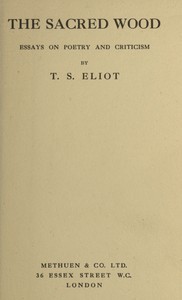The Sacred Wood: Essays on Poetry and Criticism by T. S. Eliot
"The Sacred Wood: Essays on Poetry and Criticism" by T. S. Eliot is a collection of literary essays written in the early 20th century. The work explores various aspects of poetry and criticism, reflecting Eliot's thoughts on the evolution of literary practices and the roles of the poet and critic in society. It discusses the importance of tradition, the relationship between old and new works, and the proper function of criticism within
literature. The opening portion introduces Eliot’s perspective on literary criticism through a reflection on Matthew Arnold and the Romantic Generation. He critiques the overemphasis of personal sentiment in criticism and the tendency of critics to stray from the essential task of comprehending literature itself. Eliot articulates his belief that true criticism should involve a historical awareness, recognizing the influence of past works on contemporary literature. He emphasizes the necessity to engage with the entire literary tradition, arguing that a poet’s value is inherently tied to their understanding of and relationship with both contemporary and historical texts. This sets the stage for a deeper investigation into the nature of poetic expression and the critic's role in articulating and preserving the art form. (This is an automatically generated summary.)
Read or download for free
| How to read | Url | Size | |||
|---|---|---|---|---|---|
| Read now! | https://www.gutenberg.org/ebooks/57795.html.images | 317 kB | |||
| EPUB3 (E-readers incl. Send-to-Kindle) | https://www.gutenberg.org/ebooks/57795.epub3.images | 256 kB | |||
| EPUB (older E-readers) | https://www.gutenberg.org/ebooks/57795.epub.images | 254 kB | |||
| EPUB (no images, older E-readers) | https://www.gutenberg.org/ebooks/57795.epub.noimages | 180 kB | |||
| Kindle | https://www.gutenberg.org/ebooks/57795.kf8.images | 335 kB | |||
| older Kindles | https://www.gutenberg.org/ebooks/57795.kindle.images | 314 kB | |||
| Plain Text UTF-8 | https://www.gutenberg.org/ebooks/57795.txt.utf-8 | 274 kB | |||
| Download HTML (zip) | https://www.gutenberg.org/cache/epub/57795/pg57795-h.zip | 222 kB | |||
| There may be more files related to this item. | |||||
Similar Books
About this eBook
| Author | Eliot, T. S. (Thomas Stearns), 1888-1965 |
|---|---|
| LoC No. | 21026286 |
| Title | The Sacred Wood: Essays on Poetry and Criticism |
| Note | Reading ease score: 56.0 (10th to 12th grade). Somewhat difficult to read. |
| Note | Wikipedia page about this book: https://en.wikipedia.org/wiki/The_Sacred_Wood |
| Contents | Introduction -- The perfect critic -- Imperfect critics: Swinburne as a critic. A romantic aristocrat [George Wyndham]. The local flavour. A note on the American critic. The French intelligence -- Tradition and the individual talent -- The possibility of a poetic drama -- Euripides and Professor Murray -- Rhetoric and poetic drama -- Notes on the blank verse of Christopher Marlowe -- Hamlet and his problems -- Ben Jonson -- Philip Massinger -- Swinburne as poet -- Blake -- Dante. |
| Credits |
Produced by Meredith Bach, David King, and the Online Distributed Proofreading Team at http://www.pgdp.net. (This file was produced from images generously made available by The Internet Archive/American Libraries.) |
| Language | English |
| LoC Class | PN: Language and Literatures: Literature: General, Criticism, Collections |
| Subject | Literature |
| Subject | Criticism |
| Category | Text |
| EBook-No. | 57795 |
| Release Date | Aug 28, 2018 |
| Copyright Status | Public domain in the USA. |
| Downloads | 1114 downloads in the last 30 days. |
| Project Gutenberg eBooks are always free! | |


